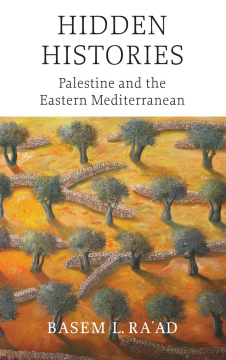
Additional Information
Book Details
Abstract
For thousands of years, Palestine and the Eastern Mediterranean have been subject to constant colonial interference, which has disenfranchised the indigenous population from their own history. Basem L. Ra'ad uncovers this history and begins the process of reconnecting it with its rightful owners.
Orientalist ideologies, colonial projects and Zionist cultural takeovers have contributed profoundly to the revisionism of Palestine's history. Drawing upon research in archaeology, linguistics and history, Ra'ad dispels many of the myths relating to religions, languages, peoples and sites. What emerges from this recovery is the presence of native people, a forgotten, submerged and subaltern, who stubbornly endure, from ancient Canaan to contemporary Palestine. Demanding that we 'unlearn' whitewashed, colonial histories, Hidden History is a process of recovery, de-colonization, revision and inclusivity.
'Draws upon the latest research in archaeology, linguistics and history to expose how Palestine's past has been appropriated for orientalist and colonialist purposes.This is a brilliant tour-de-force of recovery, decolonisation, revision and inclusivity'
Hilton Obenzinger
'Seeks to restore the history of the Eastern Mediterranean from an interested sociology of knowledge. Particularly moving is the discussion of Palestinian epistemological self-colonisation, a regrettable result of the appropriation of history'
Gayatri Chakravorty Spivak, Professor of Humanities, Columbia University
'Right on the mark ... [He explains how scholars] have created a politically tendentious history of Palestine, which has effectively marginalised every alternative history, and which has supported an intensifying effort to displace modern Palestinians from their cultural roots'
Thomas L. Thompson, Professor emeritus, University of Copenhagen
'A courageous foray into one of the most fraught terrains of history. ... Those who seek to arrive at any understanding of one of the world's most misunderstood regions would do well to read [this] closely'
Djelal Kadir, The Edwin Erle Sparks Professor of Comparative Literature, Pennsylvania State University
Table of Contents
| Section Title | Page | Action | Price |
|---|---|---|---|
| Cover | Cover | ||
| Contents | vii | ||
| List of Ilustrations | viii | ||
| Credits | x | ||
| Preface | xi | ||
| Introduction: Understanding the History of the Eastern Mediterranean | 1 | ||
| Part One: Ancient Myths, Religions, and Cultures | 13 | ||
| 1. “Canaan Nails”: Idealized Perceptions and Their Uses | 15 | ||
| 2. Polytheistic Origins of Monotheism | 47 | ||
| 3. Sacred Sites, Pagan Roots | 67 | ||
| 4. Ugaritic Revelations: What an Ancient City Tells Us | 88 | ||
| 5. Wheels of Fortune: The Alphabet | 98 | ||
| Part Two: Modern Myths and (De)Colonized History | 109 | ||
| 6. “Last of the Phoenicians”: Identity Questions | 111 | ||
| 7. Appropriation: Zionist Cultural Takeover | 123 | ||
| 8. Self-Colonization: Symptoms and Outcomes | 142 | ||
| 9. Cats of Jerusalem | 160 | ||
| 10. Politics of Place Names | 175 | ||
| 11. Epilogue: Retrieving the Ancient Subaltern | 196 | ||
| Notes | 219 | ||
| References | 244 | ||
| Index | 255 |
